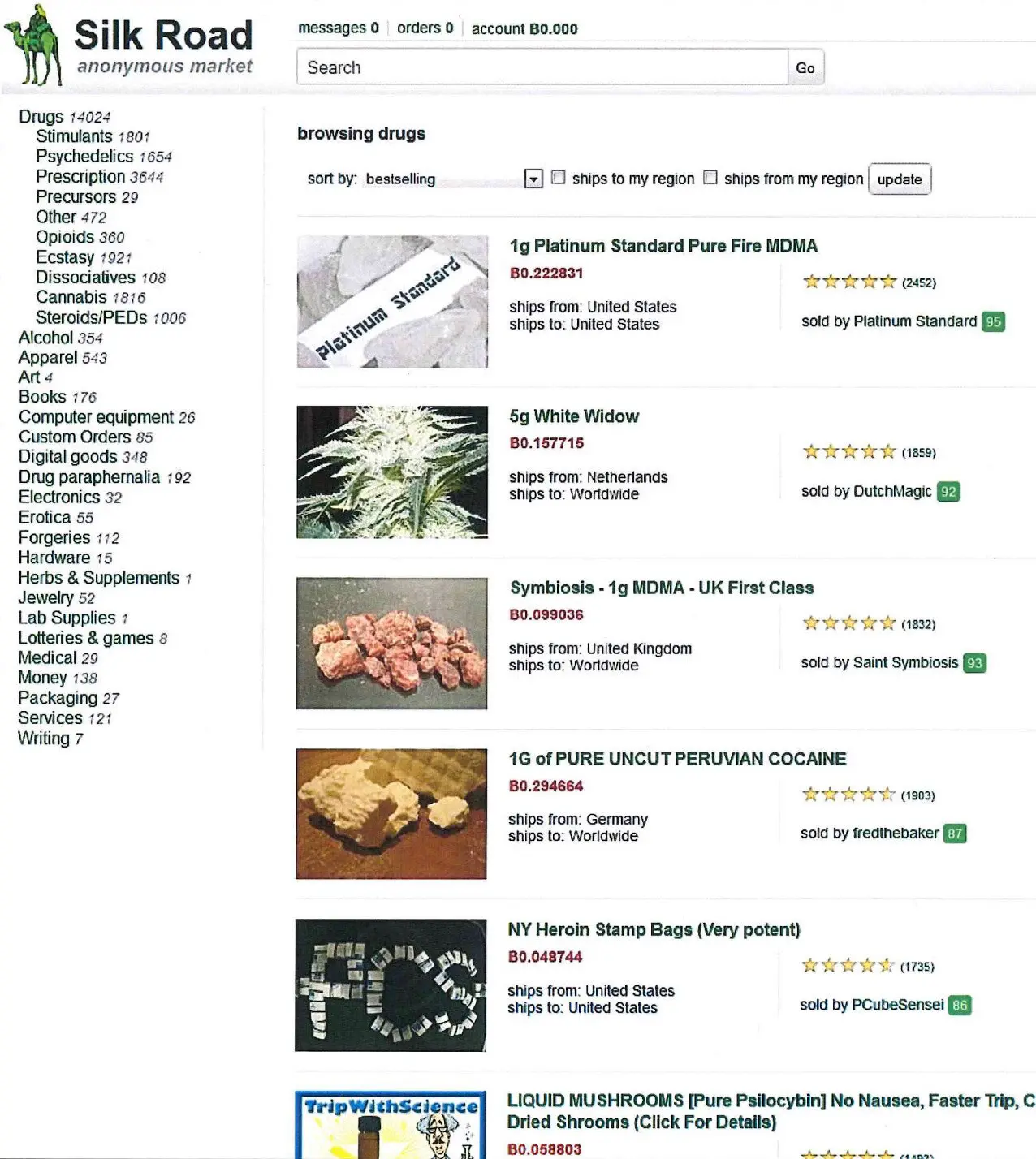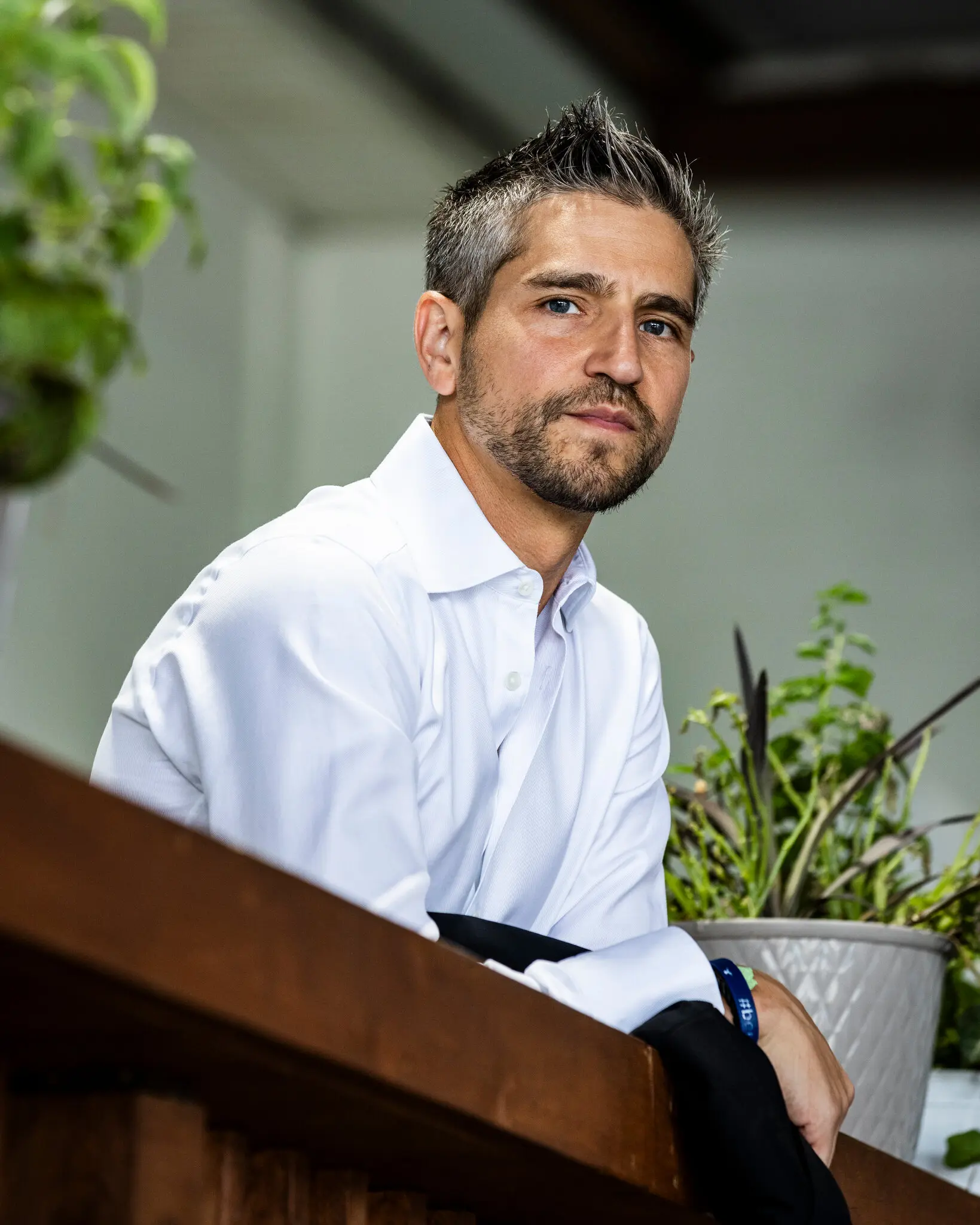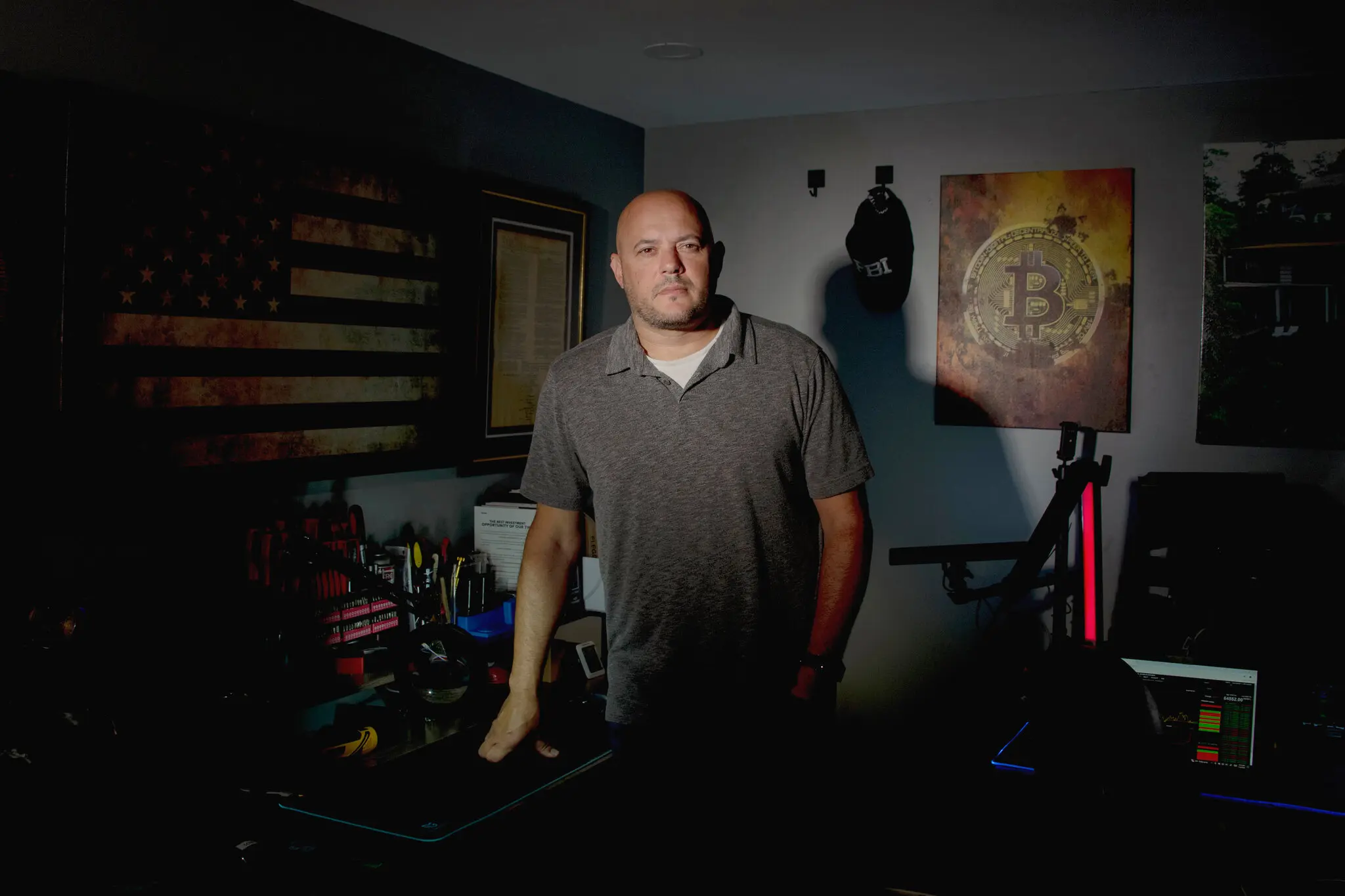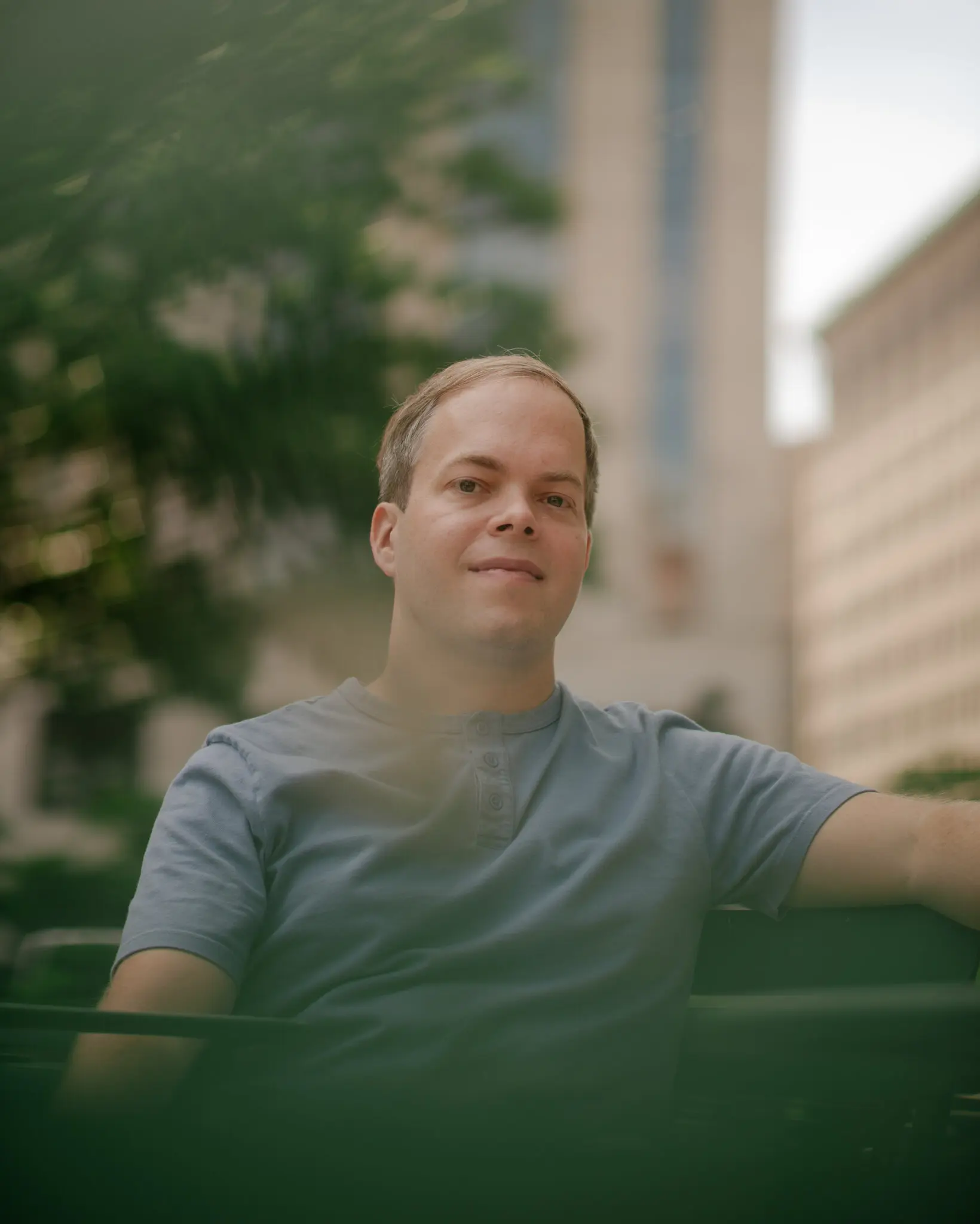Authored by: Ryan Mac and Kashmir Hill, The New York Times
Translated by: Yangz, Techub News
In May of this year, at a cryptocurrency conference held in Austin, Blake Emerson Benthall, like dozens of other entrepreneurs, actively mingled with potential investors, trying to raise funds from them. Certainly, none of them could showcase their experience as a leader of a multimillion-dollar drug crime network like Benthall.
In the "Deal Flow" area of the conference, the 1.62-meter-tall Benthall, clean-shaven and wearing a gray T-shirt with his startup company logo, turned his laptop on the table and began to introduce his situation to a potential investor wearing glasses.
"I am a lifelong entrepreneur," Benthall said as he slid through the PPT, detailing how he operated Silk Road 2.0 (Silk Road 2.0 was the second iteration of the dark web Silk Road, with 1.7 million anonymous registered users purchasing drugs such as methamphetamine and heroin through Bitcoin). He then recounted his arrest by the FBI and his experiences in the years that followed. After the presentation, Benthall closed the computer and reached a "deal" with the investor for $150,000 on the spot.
Now, at the age of 36, Benthall, who has completed his sentence and probation, is promoting his two-year-old company, Fathom(x). The company aims to provide software for tracking cryptocurrency transactions to ensure legal compliance for businesses and government agencies.
Benthall knows that it's quite bizarre for someone with a criminal record to impart compliance knowledge to others. However, in an industry full of fraudsters, Benthall believes that his experience can help uncover fraudulent activities and prevent scams like FTX from happening again.
Although Fathom(x) has not yet gained market attention, Benthall's attendance at the Consensus conference indicates that his decade-long journey on the path of legality is coming to an end. Along the way, Benthall has experienced many hardships, such as his childhood in a Christian homeschooling environment and operating a website with illegal drug sales amounting to $8 million per month. To atone, he spent nearly 10 years secretly assisting the government in combating cryptocurrency abuse.
This is a journey tracing Bitcoin's evolution from a speculative digital currency associated with dark web crime to a Wall Street-recognized investment asset. Even some skeptical government investigators who were involved in the Silk Road case have become fervent cryptocurrency advocates. One former FBI special agent named Vincent D'Agostino even invested in Benthall's startup company.
From Homeschooled Boy to Online Drug Lord

Blake Benthall at the age of four or five playing on a computer
Benthall grew up in Houston as the only child in the family and was homeschooled. His parents were devout Christians, with his mother Sharon Benthall being a community college teacher and his father Larry being a software manager. In his mother's eyes, Benthall was "reserved, cautious, and very smart," while his father often held him on his lap while working, and the computer used for work eventually became the link for his son to connect with the outside world.
At the age of 7, Blake started making websites for the Beanie Babies series. At 14, he co-founded a web game hosting company with another teenager he met on AOL Instant Messenger. He used his mother's PayPal account to order a computer server and promised to repay his mother for the server's cost with customer subscription fees.
"Looking back, some things were indeed unusual," Sharon Benthall said.
The Benthalls recalled their attempts to control Blake's internet time, but the young boy was already immersed in the internet, finding the friendships and joy he should have gained in church and Boy Scouts online.
After briefly attending a small Christian school, Florida College, near Tampa, Benthall moved to San Francisco in 2009 to pursue his tech dreams. Initially, he worked for a startup, developing an app to control children's gaming time for parents. However, the company went bankrupt four months later.
Subsequently, Benthall shuttled between the Bay Area and Florida, taking on various temporary jobs and spending his spare time immersed in various "rabbit holes" in the online world. Among them, what fascinated him the most was Bitcoin, a cryptocurrency worth about $130 at the time, which allowed people to conduct anonymous online transactions. Benthall read an interview in 2013 with a mysterious figure calling himself Dread Pirate Roberts. He operated a website called "Silk Road," a dark web market for illegal drugs, and provided privacy protection services for both buyers and sellers using Bitcoin and Tor (software for anonymous network identity), seemingly beyond the reach of the authorities.
As a "cyber-addicted teenager," Benthall hoped to browse the internet without leaving a trace, so he downloaded Tor. Then, one afternoon in October 2013, a groundbreaking news story he saw on a gym TV in San Francisco changed his life: law enforcement had shut down Silk Road and arrested Dread Pirate Roberts, who turned out to be Ross Ulbricht, a 29-year-old who lived near Benthall's home and was arrested in a library nearby.
Benthall did not use drugs and had never visited Silk Road, but when he learned that the authorities had seized 26,000 bitcoins, he immediately ended his workout, hurried home, and immersed himself in the "dark web drama."
Benthall discovered that after the FBI shut down the Silk Road website, its forums remained active. Some users were afraid of being identified or arrested, but what surprised Benthall more was that other users were already discussing establishing new drug markets. Benthall believed that these chat contents could be deleted at any time, so he used a computer program to save the forum posts.
This marked the beginning of Benthall's new career. After a Silk Road moderator saw the forum data being copied, he asked to know the person behind it. When Benthall revealed his identity in an anonymous chat service, the moderator asked him many technical questions and eventually offered Benthall $50,000 worth of bitcoins to build a new website.

Benthall knew that helping to build an illegal drug market while authorities were investigating was not appropriate, but in a tight financial situation and just after an interview with SpaceX without getting hired, he began to convince himself that his work on Silk Road was just some temporary coding work. "At 25, I didn't understand the concept of conspiracy," Benthall said. "I thought I was just an anonymous backend developer, with minimal risk."
Of course, at that time, Benthall also did not consider the potential criminality and harm associated with the dark web or the freedom to use drugs. He believed in the libertarian arguments put forward by Dread Pirate Roberts, that Silk Road could reduce the risks associated with drugs by allowing users to rate products and sellers.
Benthall spent three weeks writing what would later become Silk Road 2.0, and the website went live a month after Ulbricht's arrest.
At this point, Benthall planned to leave, but the moderator who hired him suggested that if he continued to manage the website's servers, he could receive 50% of the profits.
"I definitely knew it was illegal," Benthall said, but the website attracted 100,000 registered users on its first day. "It felt great, people were finally using something I created."
In December of the same year, Benthall received an offer from SpaceX for a position as a flight software engineer. Despite the relatively low salary and the need to commute between the Bay Area and the company's headquarters in Southern California every week, he accepted the offer because it was his "dream job."
And so, Benthall began his "double life."
Double Life
Silk Road 2.0 grew rapidly, but due to the exit of a partner (later arrested and confirmed to be a 19-year-old residing in the UK), Benthall had to choose between shutting down the market and running it alone.
"I took over all the leadership," Benthall said. "Overnight, I became the head of the world's largest drug sales website."
Running Silk Road 2.0 consumed all of Benthall's energy, making it difficult for him to focus during the day at SpaceX. Once, he even crawled into a prototype of SpaceX's Dragon spacecraft and took a nap.
Every night was a time for Benthall to "accumulate wealth." Silk Road 2.0 extracted about 8% commission from each transaction, resulting in a monthly income of $500,000 for him. Benthall used part of this income to hire over a dozen anonymous users to help provide customer service.
In January 2014, Benthall purchased a Tesla Model S worth $127,000 with Bitcoin, living a luxurious life. He would fly by private plane to Lake Tahoe, attend the Coachella music festival, and share the scenic views along the way on Instagram.
Benthall never brought the computer used for his "dark web life" into SpaceX, fearing that security personnel would discover his activities. However, on a day in February when hackers invaded Silk Road 2.0 and stole about $2.7 million worth of Bitcoin, he overheard a colleague's comment in the SpaceX cafeteria: "Can you believe someone restarted that stupid website? What an idiot."
Soon after, SpaceX dismissed Benthall for poor performance, and he plunged further into his criminal enterprise. The website announced that it would not take any profits until customers were compensated.
As a result, people continued to use the dark web market, and Benthall became even more reliant on his anonymous customer service team. He said that despite the network being hacked, the busy work, and the legal risks, he still felt a responsibility to continue operating the website.
However, the legal consequences came faster than Benthall had imagined.
Legal Consequences

Jared Der-Yeghiayan was one of the anonymous users hired by Benthall, responsible for customer service. He was actually an undercover agent for the Department of Homeland Security.
Among the anonymous users hired by Benthall was an undercover agent for the Department of Homeland Security named Jared Der-Yeghiayan, who helped Benthall provide customer service. Der-Yeghiayan had previously assisted in the investigation of the original Silk Road, gaining Ulbricht's trust by posing as a helpful community moderator. This time, Der-Yeghiayan spent several months infiltrating Silk Road 2.0, but his gains were limited. He only knew Benthall's alias "Defcon" and his technical acumen.
The real breakthrough in the FBI's bust of Silk Road 2.0 came from researchers at Carnegie Mellon University. The research team developed a method to reveal the location of dark web servers that Tor had been trying to conceal. Federal authorities immediately used this method to link "Benthall" to Silk Road 2.0. When investigators found that Benthall's most recent job was at SpaceX through a Google search, they initially thought someone had stolen his identity. Gary Alford, a special agent with the IRS who was responsible for the case, recalled jokingly, "A real rocket scientist" was running this website.
To gather more evidence, the FBI surveilled Benthall for five months. Then, on an afternoon in November 2014, after Benthall drove away from his home in a Tesla, agents surrounded him and successfully arrested him.
Der-Yeghiayan and Vincent D'Agostino (a former FBI agent from New York who had also been involved in the original Silk Road case) took him back home and handcuffed him.
During months of surveillance, D'Agostino read through Benthall's forum posts, looked through his Twitter, and even watched his university cover band performances on YouTube. D'Agostino believed he had a thorough understanding of Benthall, and with his previous similar work experience, he pointed out that Benthall didn't seem like a hardened criminal.
In his view, Benthall is not in the same league as Ulbricht. Ulbricht was a radical libertarian who was skeptical of government authority and was accused of hiring someone to kill five people who might expose his actions (although none of the five died), and was ultimately sentenced to life in prison. (Recently, Trump stated that if he is elected as the next President of the United States, he will pardon Ulbricht).
D’Agostino stated that Benthall's goal was more about "making the website better." "Builders sometimes overlook the potential impact of what they are doing." "The pure joy of building a website is the pleasure they get." He believed that these skills could be useful to the government.
In Benthall's apartment, D’Agostino and Der-Yeghiayan showed Benthall chat records that he thought had been deleted, telling him that they knew he was Defcon and had searched his parents' home in Houston, urging him to cooperate with the investigation.
At that moment, Benthall knew he was done for. Recalling his thoughts at the time, Benthall said, "All I needed to do was make them believe I wasn't a radical." Benthall said that after a moment of prayer, he handed over the digital keys to the website and the Bitcoin wallet, and after midnight, he told investigators how Silk Road 2.0 operated. He did not reveal the names of other individuals because all participants were anonymous, but he did create a tool to extract the data they wanted from the website.
Regarding Benthall's reaction, Der-Yeghiayan said, "He immediately showed remorse, I believe he was genuinely repentant."
Cooperation with the FBI
After federal prosecutor Katie Haun opposed bail, Benthall spent the first few nights after his arrest in Oakland Prison. At a hearing, the judge told him that he would face at least 10 years in prison. Later, Benthall was transferred to the Queens Detention Center in New York and was prosecuted there.
A few weeks after Benthall arrived at the detention center, D’Agostino took him to an interrogation room near the FBI's Chinatown office. After handcuffing him to the desk, agents placed a laptop in front of him and asked for his technical assistance. This is how Benthall's cooperation with the FBI began. "It was the most stressful hackathon of my life," Benthall said, realizing it was a rare opportunity.
The raid on Silk Road 2.0 was just the first step in the closure of dozens of dark web markets. D’Agostino said that the FBI was "drowning in data" at the time and urgently needed someone with technical skills to help process the data.
With the support of the federal prosecutor, investigators began discussing a cooperation agreement with Benthall's lawyer, Jean-Jacques Cabou. If Benthall was willing to provide assistance to the government, the judge might consider a lighter sentence in the future.
Soon, Benthall was left alone to work in a locked FBI interrogation room, with the handcuffs removed, but still under supervision when using the restroom.
One day, D’Agostino handed Benthall a polo shirt and drove him to a shopping center in Queens. D’Agostino gave Benthall a $5 bill and asked him to wander around the food court. FBI agents watched Benthall like a "kid" and asked for the change when he bought a cup of Wendy's coffee.
D’Agostino said, "Our goal was to gradually build a relationship with him so that we could trust him more and gather more information."

In 2014, Vincent D'Agostino, then an FBI agent, arrested Benthall. He later left the agency and recently invested in Benthall's startup.
In July 2015, Benthall pleaded guilty to four charges, including drug trafficking and money laundering, and signed a cooperation agreement, formally committing to work for the government. After eight months in prison, Benthall was allowed to move to an apartment in Queens and became a full-time, ankle-monitored cybercrime consultant, receiving compensation in the form of freedom and allowances (a $1 pizza, toothpaste, and subway fare).
During this time, Benthall helped investigate large-scale corporate hacking attacks, tracked Bitcoin transactions to try to identify criminals, and even provided training for investigators at the FBI office in Quantico, Virginia. He said, "The U.S. government holds a large amount of cryptocurrency, and ensuring its security is indeed a worrying issue."
Benthall considered himself particularly lucky because he had the skills the government needed at the right time. Brian Farrell, who provided services to him under the name "DoctorClu," was sentenced to six years in prison. Benthall believed that it was fundamentally unfair that "people with lower relevance" were given heavier sentences.
Benthall refused to discuss the specific details of his work for the government. However, he mentioned a case where someone had threatened to blow up a school in New York City and demanded a Bitcoin ransom. Benthall helped confirm the person's identity by tracking the encrypted wallet address. (The FBI declined to comment, with a spokesperson writing, "There are no publicly available documents detailing Benthall's actions.")
However, Benthall's seemingly free life also led to him developing paranoia. He said, "Once you are under surveillance by a nation-state, the way you see the world really changes." He felt that he was being constantly watched and was afraid of being recognized by Silk Road 2.0 customers. Fortunately, Benthall received treatment (covered by the government) and returned to a normal life. He sang and played the guitar at open mic events, started going to church, and made friends. However, he continued to hide his past, and everyone called him by his middle name, "Emerson."
Michael White, the executive director of the church CityLight Church that Benthall often visited, said, "As a pastor, people are usually open with me." "But there was this one person, and I knew nothing about him except that his name was Emerson."
A New Beginning?
Over the next five years, Benthall worked with some of the agents who had previously taken down Silk Road and Silk Road 2.0. As time passed and Bitcoin became mainstream, breaking through $10,000, some government employees left the government and entered the private sector, specifically the cryptocurrency industry.
One of the most notable figures was the former federal prosecutor Katie Haun, who initially opposed Benthall's bail. In 2018, she joined the venture capital firm Andreessen Horowitz, investing in cryptocurrency companies and raising her own $1.5 billion fund four years later.
D’Agostino was initially skeptical of Bitcoin, but later came to believe that Bitcoin would "change the world." He installed Bitcoin mining software at home and eventually left the FBI to join a private security company, providing assistance to companies affected by ransomware attacks. Der-Yeghiayan currently works at the blockchain analysis company Chainalysis.
As officials around him left one by one, Benthall did not know how long he would continue to work in the government. In theory, he was released on bail, but he had not been sentenced, and there was no definite end date for the so-called repentance.
Former prosecutor and Columbia Law School professor Daniel Richman stated that such an arrangement for Benthall is not common, but in cases where someone's "culpability is sufficient to warrant prosecution but not so great as to pose a risk during bail," it does happen. "It sounds like indentured servitude," Richman added, "but it ultimately benefits both parties."
By 2020, Covid-19 provided a potential way out for Benthall. When everyone started working from home, Benthall asked the judge if he could work from his parents' home in Houston.
The following spring, Benthall believed he had done enough work to help the government and requested the court to formally sentence him. In March, he and his parents flew to Manhattan for a hearing. Wearing a suit and uncomfortable shoes, Benthall received the judgment he had hoped for: time served, three years of probation, during which he must continue to work for the government as needed. Since the judgment was not made public, Benthall also avoided discussing it, fearing it would jeopardize the arrangement.
Nevertheless, with a criminal record, Benthall found it difficult to find work in life. He needed to repay his parents for the legal fees they had paid for him and support his child. After three job offers were rescinded, Benthall decided to start Fathom(x) in the spring of 2022. He said that his "lifelong dream" was to become a founder, and this time, it was a legal dream.

Benthall spent eight months in prison and assisted the government for several years according to the cooperation agreement. In March 2021, he was sentenced to a term of imprisonment and three years of probation.
The slogan of Fathom(x) is simple: to verify whether a company actually owns the cryptocurrency it claims to have, and whether these cryptocurrencies are clean. Benthall believes that his years of government work experience have increased his credibility. He is also pleased that D’Agostino became an investor in Fathom(x). Benthall said, "I made the special agent who arrested me believe in me."
After D’Agostino left the FBI, the two remained in contact for many years. When Benthall still lived in New York, D’Agostino invited him to barbecue and karaoke. And when Benthall started this new company, he called D’Agostino for advice. D’Agostino said, "The person I'm talking to now is not the same person I arrested ten years ago."
D’Agostino is not the only former "colleague" Benthall has encountered in his new life. Benthall has also pitched his software to government agencies, including the IRS, where Alford, a Silk Road investigator, still works.
"Life is so strange," Alford recalled a video conference where Benthall gave a demonstration to him and other IRS agents. While felons are not prohibited from working for the federal government, John Pelissero, a government ethics expert at Santa Clara University, said he was surprised that Benthall was not on the "do not hire" list. Alford did not disclose whether the IRS is using Fathom(x).
Benthall is unwilling to disclose the specific clients of his current company or the size of the fundraising. Fathom(x) is small, with only two contractors, but Benthall said the company is profitable.
In addition to running his new company, Benthall has also come to realize the harm that operating a website selling dangerous goods can cause to people. During his time in New York, the experience of a friend dying from a drug overdose convinced him that, given the large number of Silk Road users, someone was bound to be harmed by purchasing drugs.
On his way to attend the Consensus conference, Benthall used his middle name when ordering at a coffee shop, partly out of reflex and perhaps because he was still thinking about how to face his past. He imagined that when he started using his full name, a Silk Road victim might confront him angrily.
"People have the right to do that," he said, "so I often think about how I should face them."
免责声明:本文章仅代表作者个人观点,不代表本平台的立场和观点。本文章仅供信息分享,不构成对任何人的任何投资建议。用户与作者之间的任何争议,与本平台无关。如网页中刊载的文章或图片涉及侵权,请提供相关的权利证明和身份证明发送邮件到support@aicoin.com,本平台相关工作人员将会进行核查。




